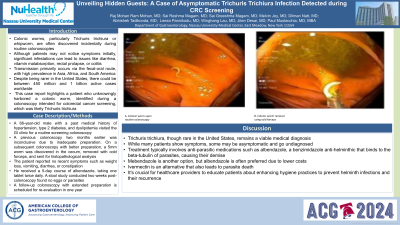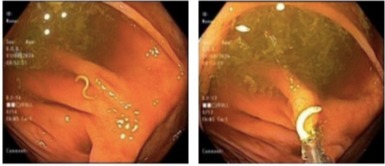Sunday Poster Session
Category: Colon
P0289 - Unveiling Hidden Guests: A Case of Asymptomatic Trichuris Trichiura Infection Detected during CRC Screening
Sunday, October 27, 2024
3:30 PM - 7:00 PM ET
Location: Exhibit Hall E

- LP
Leeza Pannikodu, MD
Nassau University Medical Center
East Meadow, NY
Presenting Author(s)
Raj Mohan Ram Mohan, MD, Sai Reshma Magam, MD, Sai Greeshma Magam, MD, Melvin Joy, MD, Dilman Natt, MD, Abhishek Tadikonda, MD, Leeza Pannikodu, MD, Winghang Lau, MD, Jiten Desai, MD, Paul Mustacchia, MD, MBA
Nassau University Medical Center, East Meadow, NY
Introduction: Colonic worms, particularly Trichuris trichiura or whipworm, are often discovered incidentally during routine colonoscopies. Although patients may not notice symptoms initially, significant infestations can lead to issues like diarrhea, vitamin malabsorption, rectal prolapse, or colitis. Transmission primarily occurs via the fecal-oral route, with high prevalence in Asia, Africa, and South America. Despite being rarer in the United States, there could be between 450 million and 1 billion active cases worldwide. This case report highlights a patient who unknowingly harbored a colonic worm, identified during a colonoscopy intended for colorectal cancer screening, which was likely Trichuris trichiura.
Case Description/Methods: A 66-year-old male with a past medical history of hypertension, type 2 diabetes, and dyslipidemia visited the GI clinic for a routine screening colonoscopy. A previous colonoscopy two months earlier was inconclusive due to inadequate preparation. On a subsequent colonoscopy with better preparation, a 5mm worm was discovered in the cecum, removed with cold forceps, and sent for histopathological analysis. The patient reported no recent symptoms such as weight loss, vomiting, diarrhea, or constipation. He received a 5-day course of albendazole, taking one tablet twice daily. A stool study conducted two weeks post-colonoscopy found no eggs or parasites. A follow-up colonoscopy with extended preparation is scheduled for re-evaluation in one year.
Discussion: Trichuris trichiura, though rare in the United States, remains a viable medical diagnosis. While many patients show symptoms, some may be asymptomatic and go undiagnosed. Treatment typically involves antiparasitic medications such as albendazole, a benzimidazole anthelmintic that binds to the beta-tubulin of parasites, causing their demise. Mebendazole is another option, but albendazole is often preferred due to lower costs. Ivermectin is an alternative that also leads to parasite death. It's crucial for healthcare providers to educate patients about enhancing hygiene practices to prevent helminth infections and their recurrence.

Disclosures:
Raj Mohan Ram Mohan, MD, Sai Reshma Magam, MD, Sai Greeshma Magam, MD, Melvin Joy, MD, Dilman Natt, MD, Abhishek Tadikonda, MD, Leeza Pannikodu, MD, Winghang Lau, MD, Jiten Desai, MD, Paul Mustacchia, MD, MBA. P0289 - Unveiling Hidden Guests: A Case of Asymptomatic Trichuris Trichiura Infection Detected during CRC Screening, ACG 2024 Annual Scientific Meeting Abstracts. Philadelphia, PA: American College of Gastroenterology.
Nassau University Medical Center, East Meadow, NY
Introduction: Colonic worms, particularly Trichuris trichiura or whipworm, are often discovered incidentally during routine colonoscopies. Although patients may not notice symptoms initially, significant infestations can lead to issues like diarrhea, vitamin malabsorption, rectal prolapse, or colitis. Transmission primarily occurs via the fecal-oral route, with high prevalence in Asia, Africa, and South America. Despite being rarer in the United States, there could be between 450 million and 1 billion active cases worldwide. This case report highlights a patient who unknowingly harbored a colonic worm, identified during a colonoscopy intended for colorectal cancer screening, which was likely Trichuris trichiura.
Case Description/Methods: A 66-year-old male with a past medical history of hypertension, type 2 diabetes, and dyslipidemia visited the GI clinic for a routine screening colonoscopy. A previous colonoscopy two months earlier was inconclusive due to inadequate preparation. On a subsequent colonoscopy with better preparation, a 5mm worm was discovered in the cecum, removed with cold forceps, and sent for histopathological analysis. The patient reported no recent symptoms such as weight loss, vomiting, diarrhea, or constipation. He received a 5-day course of albendazole, taking one tablet twice daily. A stool study conducted two weeks post-colonoscopy found no eggs or parasites. A follow-up colonoscopy with extended preparation is scheduled for re-evaluation in one year.
Discussion: Trichuris trichiura, though rare in the United States, remains a viable medical diagnosis. While many patients show symptoms, some may be asymptomatic and go undiagnosed. Treatment typically involves antiparasitic medications such as albendazole, a benzimidazole anthelmintic that binds to the beta-tubulin of parasites, causing their demise. Mebendazole is another option, but albendazole is often preferred due to lower costs. Ivermectin is an alternative that also leads to parasite death. It's crucial for healthcare providers to educate patients about enhancing hygiene practices to prevent helminth infections and their recurrence.

Figure: A. Colonic Worm
B. Worm Removal using Cold Forceps
B. Worm Removal using Cold Forceps
Disclosures:
Raj Mohan Ram Mohan indicated no relevant financial relationships.
Sai Reshma Magam indicated no relevant financial relationships.
Sai Greeshma Magam indicated no relevant financial relationships.
Melvin Joy indicated no relevant financial relationships.
Dilman Natt indicated no relevant financial relationships.
Abhishek Tadikonda indicated no relevant financial relationships.
Leeza Pannikodu indicated no relevant financial relationships.
Winghang Lau indicated no relevant financial relationships.
Jiten Desai indicated no relevant financial relationships.
Paul Mustacchia indicated no relevant financial relationships.
Raj Mohan Ram Mohan, MD, Sai Reshma Magam, MD, Sai Greeshma Magam, MD, Melvin Joy, MD, Dilman Natt, MD, Abhishek Tadikonda, MD, Leeza Pannikodu, MD, Winghang Lau, MD, Jiten Desai, MD, Paul Mustacchia, MD, MBA. P0289 - Unveiling Hidden Guests: A Case of Asymptomatic Trichuris Trichiura Infection Detected during CRC Screening, ACG 2024 Annual Scientific Meeting Abstracts. Philadelphia, PA: American College of Gastroenterology.
